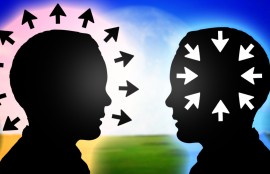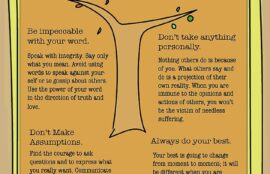
This article first appeared on QuietRev.com,
illustrations by Liz Fosslein and Mollie West
Dear Extroverts,
We love your energy and excitement. But as introverts, we sometimes feel misunderstood. We wish you could visualize what’s going on inside our brains—you might be surprised! Here are six illustrations of what it’s like to be in our heads.
Sincerely,
Introverts
1. According to The Introvert Advantage by Marti Olsen Laney, introverts have a longer neural pathway for processing stimuli. Information runs through a pathway that is associated with long term memory and planning. In other words, it’s more complicated for introverts to process interactions and events. As they process information, introverts are carefully attending to their internal thoughts and feelings at the same time.
2. According to studies by psychologist Hans Eysenck, introverts require less stimulation from the world in order to be awake and alert than extroverts do. This means introverts are more easily over-stimulated.
3. The flip side of introverts’ sensitivity to dopamine is that they need less of it to feel happy. Extroverts’ brains run on an energy-spending nervous system, whereas introverts’ brains run on an energy-conserving nervous system. This is why introverts feel content and energized when reading a book, thinking deeply, or diving into their rich inner world of ideas.
4. Introverts’ brains aren’t as strongly rewarded for gambling or taking risks as extroverts’ brains are. The brain’s reward and pleasure system is activated by dopamine neurotransmitters. Scientists found that extroverts’ brains responded with more pleasure to positive gambling results. In other words, introverts feelless excitement from surprise or risk.
5. The introvert’s brain treats interactions with people at the same intensity level that it treats encounters with inanimate objects. Introverts process everything in their surroundings and pay attention to all the sensory details in the environment, not just the people.
6. As introverts are thinking, they reach back into long-term memory to locate information. An introvert will often compare old and new experiences when making a decision, which slows the processing down but leads to carefully thought-out decisions.This means that introverts have an active dialogue with themselves and usually walk around with many thoughts in their minds.
You can find more insights from Quiet Revolution on work, life, and parenting as an introvert at QuietRev.com. Follow Quiet Revolution on Facebook and Twitter.



























Sorry, the comment form is closed at this time.